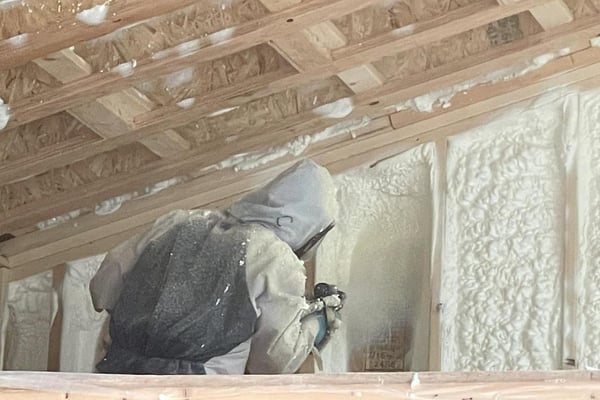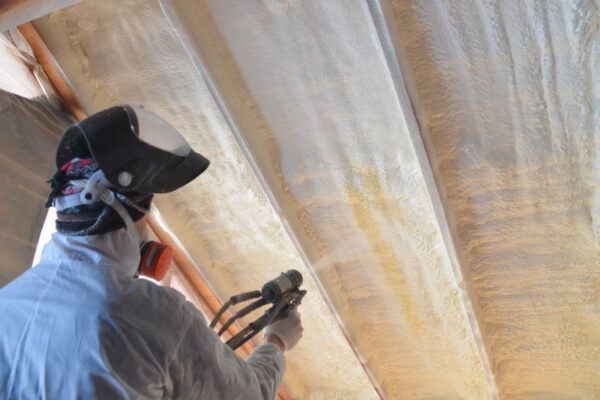Usual Myths Regarding Spray Foam: Debunking the Misconceptions
Usual Myths Regarding Spray Foam: Debunking the Misconceptions
Blog Article
Spray Foam: The Ultimate Service for Air Sealing and Insulation
Spray foam insulation has actually arised as a leading option for efficient air sealing and thermal insulation, using an one-of-a-kind combination of homes that set it apart from conventional techniques. Its capability to broaden and load gaps makes it specifically efficient in stopping air leakage, which can significantly influence power effectiveness. Understanding the complete scope of its advantages, installment procedures, and contrasts with various other insulation kinds is crucial for making notified decisions. As we discover these aspects, the effects for both brand-new building and constructions and retrofits end up being progressively significant. What aspects should influence your selection?
What Is Spray Foam?
Spray foam is a flexible insulation material that incorporates the principles of air securing and thermal resistance to boost power efficiency in buildings. Made up largely of polyurethane or various other comparable substances, spray foam is applied as a fluid that expands upon call with surface areas, creating a strong, continuous layer of insulation. This one-of-a-kind residential or commercial property permits it to fill gaps, fractures, and gaps that traditional insulation products might forget, supplying a superior air seal.
There are 2 major kinds of spray foam: open-cell and closed-cell. Open-cell spray foam is lighter and extra versatile, providing outstanding sound absorption and a reduced R-value per inch - Spray Foam. On the other hand, closed-cell spray foam is denser, offering a greater R-value, wetness resistance, and included architectural honesty to building elements
The application process usually involves specific tools, guaranteeing a seamless application that abides by numerous substrates, consisting of wood, steel, and concrete. This adaptability makes spray foam ideal for both new buildings and retrofitting existing structures. Its capacity to create an impermeable obstacle significantly adds to reducing power intake and improving interior air high quality, therefore making it a favored option among contractors and house owners alike.
Advantages of Spray Foam Insulation
Among the most considerable advantages of spray foam insulation is its extraordinary capability to produce a continual air barrier, which effectively decreases power loss. Unlike traditional insulation materials, spray foam expands to fill cracks and spaces, making certain that air leak is significantly minimized. This characteristic not only boosts energy effectiveness however additionally results in lower energy expenses over time.
In addition, spray foam insulation provides remarkable thermal resistance, contributing to a much more secure interior atmosphere. Its high R-value per inch permits reliable insulation in restricted spaces, making it perfect for attic rooms, wall surfaces, and crawl spaces. Furthermore, the moisture-resistant homes of spray foam assistance stop mold and mildew development, advertising much healthier living conditions.
An additional vital advantage of spray foam insulation is its sound-dampening high qualities (Spray Foam). It efficiently minimizes noise transmission in between rooms, creating a quieter and a lot more comfy home setting. The sturdiness of spray foam also sticks out, as it does not sag or clear up with time, keeping its efficiency throughout its life-span
Exactly How Spray Foam Works
Recognizing just how spray foam insulation functions is essential for valuing its performance in air sealing and thermal resistance. Spray foam insulation includes two key elements: isocyanate and polyol resin. When these components are mixed, they undertake a chemical reaction that causes the product to increase swiftly, creating a thick foam that loads splits, dental caries, and voids.
As the foam expands, it complies with surfaces, developing an airtight seal that dramatically reduces air seepage. This characteristic makes spray foam insulation extremely reliable at protecting against drafts and moisture infiltration, which can result in energy loss and damage gradually. Additionally, the closed-cell version of spray foam supplies premium thermal resistance as a result of its stiff framework, successfully lessening heat transfer.
The distinct homes of spray foam permit it to conform to uneven surface areas, making certain detailed insurance coverage and a seamless obstacle. Consequently, spray foam insulation not only improves power efficiency yet likewise contributes to enhanced indoor air high quality by decreasing the accumulation of contaminants and irritants. Eventually, recognizing the auto mechanics behind spray foam underscores its function as a remarkable choice click this site for insulation and air securing in both business and property applications.
Installation Process Overview

Before installment, the space must be properly cleaned and prepped, ensuring that surfaces are devoid of particles, dust, and moisture. Due to the fact that pollutants can jeopardize attachment and general efficiency, this action is important. When the location is prepared, the application entails blending the two elements of the spray foam, which broadens upon contact and loads voids successfully.
Educated professionals ought to perform the installation, making use of customized tools to guarantee uniform coverage and optimal density. Safety precautions, including using protective gear and ensuring appropriate air flow, are vital during this procedure. After application, the foam normally treatments promptly, forming a solid barrier that enhances energy efficiency.
Comparing Spray Foam to Traditional Insulation
When examining insulation options, spray foam insulation stands out in comparison to conventional materials such as fiberglass and cellulose. Unlike fiberglass and cellulose, which can original site allow air seepage, spray foam broadens upon application, loading gaps and gaps to create an airtight seal.
In addition, spray foam gives a higher R-value per inch than standard insulation types, providing more effective thermal resistance in a thinner account. This characteristic is specifically helpful in rooms with limited tooth cavity depth. Moreover, spray foam is immune to moisture and mold development, which can be a considerable worry about cellulose and fiberglass, especially in damp environments.
However, spray foam insulation normally lugs a greater in advance expense than its traditional counterparts. House owners should go weigh this preliminary investment versus long-lasting power cost savings and performance benefits. Inevitably, while both insulation types serve their objective, spray foam emerges as an extra advanced remedy for modern-day insulation requirements, specifically in terms of air securing and thermal performance.

Conclusion
In summary, spray foam insulation stands for a very reliable service for accomplishing ideal air sealing and thermal resistance. Its one-of-a-kind residential or commercial properties, consisting of wetness resistance and audio dampening, make it suitable for different applications in both brand-new constructions and retrofitting jobs (Spray Foam). Although the first prices may be higher compared to conventional insulation materials, the long-lasting advantages, such as substantial power cost savings and boosted indoor air quality, warrant the investment and underscore its worth in contemporary structure methods.
Spray foam insulation has arised as a leading option for reliable air securing and thermal insulation, providing an unique mix of homes that establish it apart from traditional techniques.Spray foam is a functional insulation material that combines the principles of air sealing and thermal resistance to improve power performance in structures.When evaluating insulation alternatives, spray foam insulation stands out in contrast to traditional materials such as fiberglass and cellulose. Inevitably, while both insulation kinds serve their purpose, spray foam emerges as a much more sophisticated option for modern insulation needs, particularly in terms of air securing and thermal efficiency.
In summary, spray foam insulation represents an extremely efficient solution for accomplishing optimum air securing and thermal resistance.
Report this page